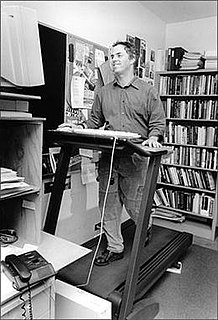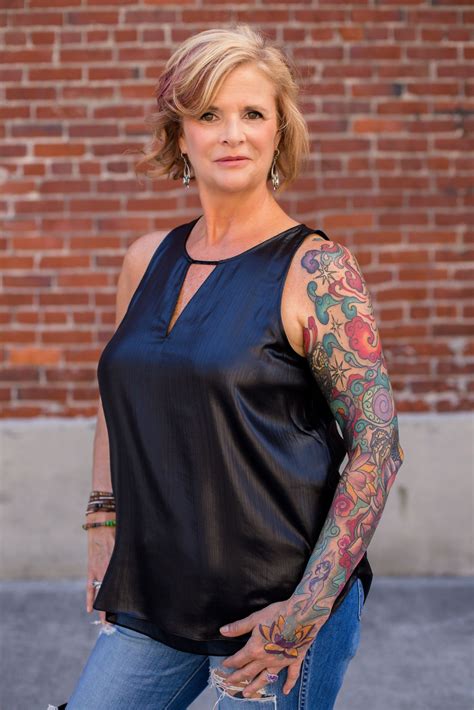A Quote by Seth Roberts
Whatever your (unfavorable) situation is, it is a good idea to ask yourself "WHAT YOU WOULD DO if you were free of it." An alcoholic's wife might wish her husband would stop drinking...On examination of her beliefs, she may discover she was frightened of not achieving her own goals and actually encouraged the alcoholism so she would not have to face her own failure.
Related Quotes
If she took Po as her husband, she would be making promises about a future she couldn't yet see. For once she became his wife, she would be his forever. And, no matter how much freedom Po gave her, she would always know that it was a gift. Her freedom would be not be her own; it would be Po's to give or to withhold. That he never would withhold it made no difference. If it did not come from her, it was not really hers.
She'd assumed she'd be married and have kids by this age, that she would be grooming her own daughter for this, as her friends were doing. She wanted it so much she would dream about it sometimes, and then she would wake up with the skin at her wrists and neck red from the scratchy lace of the wedding gown she'd dreamed of wearing. But she'd never felt anything for the men she'd dated, nothing beyond her own desperation. And her desire to marry wasn't strong enough, would never be strong enough, to allow her to marry a man she didn't love.
Selfishly, perhaps, Catti-brie had determined that the assassin was her own business. He had unnerved her, had stripped away years of training and discipline and reduced her to the quivering semblance of a frightened child. But she was a young woman now, no more a girl. She had to personally respond to that emotional humiliation, or the scars from it would haunt her to her grave, forever paralyzing her along her path to discover her true potential in life.
She realized how many of her beliefs were either unrealistic or belonged to her deceased parents and her ex-husband. She also realized that her expectations for herself and others were sometimes too rigid. She was trying to live up to what everyone else said was best for her, which made her depressed and hard to be around at times. Once she changed her beliefs about herself and others, she began to smile more and enjoy life.
I'll just be your brother from now on." he said, looking at her with a hopeful expectation that she would be pleased, which made her want to scream that he was smashing her heart into pieces and he had to stop. "That's what you wanted, isn't it?" It took her a long time to answer, and when she did, her own voice sounded like an echo, coming from very far away. "Yes," she said, and she heard the rush of waves in her ears and her eyes stung as if from sand or salt spray. "That's what I wanted.
The good enough mother, owing to her deep empathy with her infant, reflects in her face his feelings; this is why he sees himselfin her face as if in a mirror and finds himself as he sees himself in her. The not good enough mother fails to reflect the infant's feelings in her face because she is too preoccupied with her own concerns, such as her worries over whether she is doing right by her child, her anxiety that she might fail him.
She suffers as a miser. She must be miserly with her pleasures, as well. I wonder if sometimes she doesn't wish she were free of this monotonous sorrow, of these mutterings which start as soon as she stops singing, if she doesn't wish to suffer once and for all, to drown herself in despair. In any case, it would be impossible for her: she is bound.
My mother didn't feel sorry for herself, she was left with no child support, no alimony at a very young age, with a child to raise, a high school education and she just figured it out. She didn't complain, she didn't rely upon government, she relied upon her own skill set, her own self confidence, her own drive in moxie and her own duty to me and her and she relied upon her family and her faith.
So firm did Nivea's determination become that she wrote in her diary that she would give up marriage in order to devote herself completely to the struggle for women's suffrage. She was not aware that such a sacrifice would not be necessary, and that she would marry a man for love who would back her up in her political goals.
Her life was a slow realization that the world was not for her and that for whatever reason she would never be happy and honest at the same time. She felt as if she were brimming always producing and hoarding more love inside her. But there was no release. table ivory elephant charm rainbow onion hairdo violence melodrama honey...None of it moved her. She addressed the world honestly searching for something deserving of the volumes of love she knew she had within her but to each she would have to say I don't love you.
I mean, her father was an alcoholic, and her mother was the suffering wife of a man who she could never predict what he would do, where he would be, who he would be. And it's sort of interesting because Eleanor Roosevelt never writes about her mother's agony. She only writes about her father's agony. But her whole life is dedicated to making it better for people in the kind of need and pain and anguish that her mother was in.

































